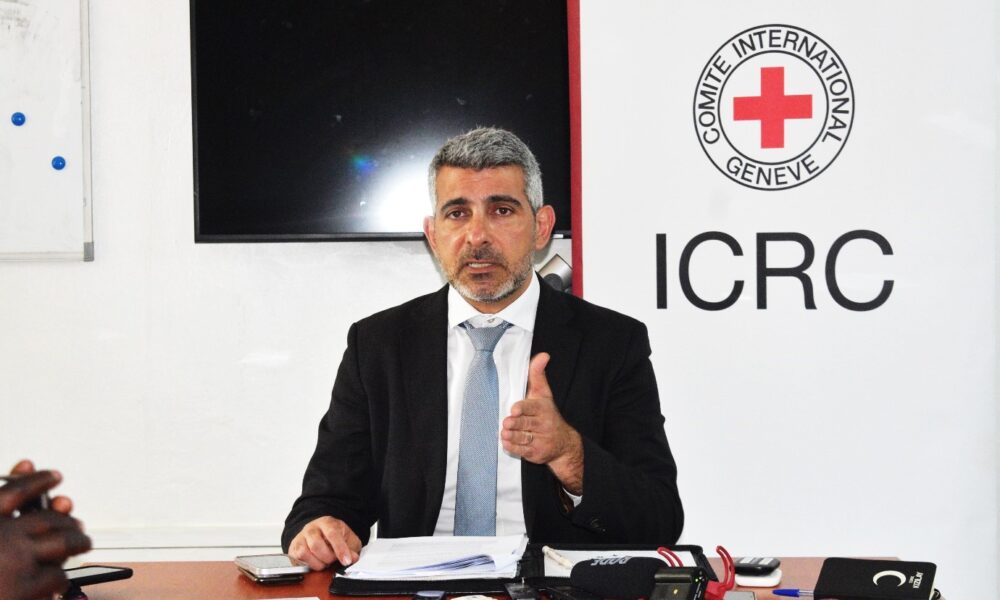By Charles K Mark
International Committee of the Red Cross (ICRC), Regional Director for Africa, has urged the interim unity government to revoke its order levying taxes on humanitarian organization supplies.
Mr. Patrick Youssef, the ICRC Regional Director for Africa, echoed the call during a media briefing in Juba on Friday after his field visits across the country.
He underscored the pressure mounted on the government due to the depreciation of the South Sudanese pound.
“There’s an inflation. I’m sure you pay your loaf of bread double the price of what you used to pay before,” Youssef exclaimed. “But again, there’s no reason not to make a space for life-saving funds.”
He explained that there is a need for the government to enable the running of the primary healthcare centers, the hospitals, the county hospitals, and the teaching hospitals while also providing food and water.
The ICRC Regional Director did tackle the question of additional taxes, no exemptions on imports, and the delivery of humanitarian assistance.
“We are clearly on the same line as many other organizations in saying that the limited amount of funds we’re receiving should completely go to the beneficiaries,” he reiterated.
“The ministry of finance needs indeed to issue a circular so that this measure is stopped,” he emphasized.
The Regional Director added that having more fees imposed on humanitarian actors is simply unbearable in a situation of global contraction.
He decried that when decisions like that are made, many organizations halt their operations and stop importing, for example, goods, because they will be taxed.
“The decision of the government should really be changed just because any interruption in the pipelines will be detrimental, especially before the rainy season, before the beginning of certain floods in certain areas, or indeed the lean season,” Youssef urged.
He emphasized that much still needs to be done to force people away from dependence, but they have no access to their lands, and they have no capacities because they require grains, seeds, and tools.
The visiting ICRC official said imposing taxes on humanitarians is a deliberate and direct undermining of the lifesaving work of humanitarian actors.
“We have met some senior government officials, including the First Vice President, Dr. Riek Machar, and Abdelbagi Ayii Akol. They were positive and made a promise to work on the concern. But we are saying it should not only be a promise. There is a law, and that law must be respected,” Youssef stressed.
Members of the international community have recently protested the South Sudan government’s imposing charges on humanitarian donations.
The embassies of Canada, France, Germany, Japan, the Netherlands, Norway, Sweden, Switzerland, the United Kingdom, and the United States of America protested in a joint statement seen by this outlet late last month.
The donor community urged the transitional government of national unity to immediately halt recent actions that have imposed illicit and unacceptable costs on donors.
They said even the UN agencies and implementing partners who are seeking to provide humanitarian assistance in South Sudan must be exempt from the costs.
Current examples of efforts to impose costs on humanitarian assistance include the e-Petroleum Accreditation Permit, according to the joint statement.
Others include customs fees, the electronic cargo tracking note, the laboratory test on food rations, and the security escort fee.
However, South Sudan government National Minister of Finance and Economic Planning, Awow Daniel Chuang issued a ministerial order on Friday, to exempt United Nations agencies, humanitarian organizations, and diplomatic missions from taxes.
But the exemption comes with limitations of not considering companies contracted by humanitarian agencies to render services.
Minister Awow underscored that the United Nations Missions in South Sudan (UNMISS) contracted companies in the country shall not be subjected to the exemption.
“These UNMISS companies contracted to render services internally shall not be part of this exemption of taxes, charges, and fees levy on goods,” he ordered.
He stressed that those contracted companies will have to pay the tariffs because they are profit-making entities.




